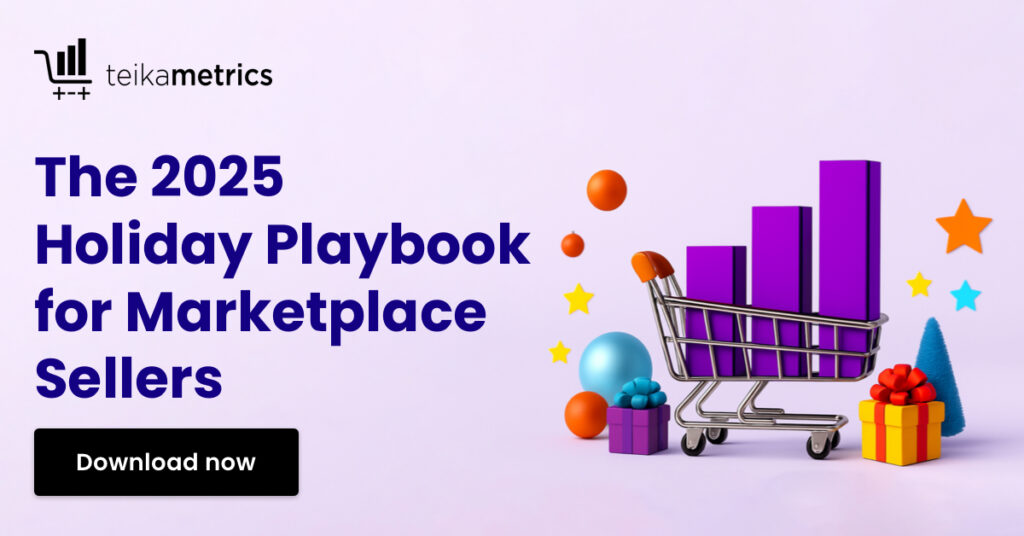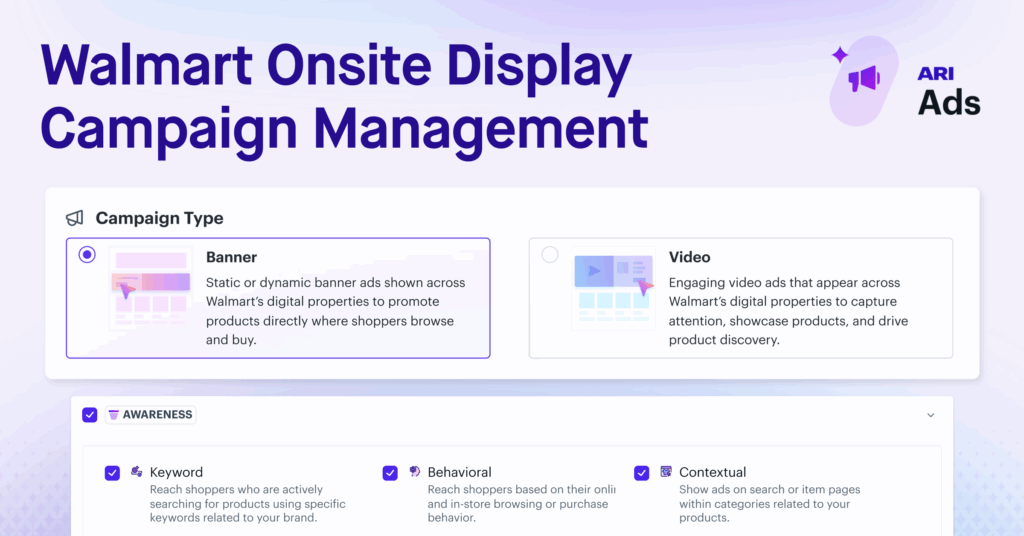The fourth quarter isn’t just another selling season—it’s the defining moment of the year.
Each year, Q4 brings opportunity and chaos in equal measure. Rising ad costs, shorter fulfillment windows, and more discerning shoppers test every decision a seller makes. In 2025, that complexity is reaching new heights, shaped by shifting buyer expectations, cross-platform shopping behavior, and the accelerating role of AI in marketplace strategy.
This post breaks down the most important lessons from The 2025 Holiday Playbook for Marketplace Sellers, drawing from Teikametrics’ decade of data and firsthand experience helping brands scale profitably through peak season.
1. Start With Clarity: Define What Success Means
Before a single dollar is spent, every brand needs one clear goal. Are you optimizing for topline growth, margin protection, or market share gains? Each path requires different trade-offs in ad spend, discounting, and inventory allocation.
Without a specific objective, sellers often overspend on promotions or underinvest in the moments that matter most. The brands that win Q4 know exactly what they’re chasing—and align their budgets, metrics, and staffing around that outcome.
Action Steps
- Set one or two measurable KPIs to track daily throughout the season.
- Build a flexible budget that leaves 10 to 20 percent unallocated for real-time optimization.
- Align every internal stakeholder around your single most important goal.
2. Build an Inventory Plan That Protects Margins
Inventory management makes or breaks Q4. Stockouts destroy momentum, but overbuying locks up cash and erodes profit through storage fees. The key is balance, not excess.
Use your 2024 data as a baseline, adjust for current category growth and tariffs, and factor in fulfillment cutoffs early. Then, prioritize products by profitability and demand potential.
Action Steps
Create a liquidation plan for slower SKUs before January fees hit.
Back proven performers with safety stock and flexible replenishment.
Promote high-margin products to offset discounts elsewhere.
3. Optimize Listings for Holiday Intent
During Q4, buyers move fast. They’re not browsing—they’re searching with purpose. Listings that fail to instantly communicate relevance, trust, and urgency get left behind.
Successful sellers treat listing optimization as a continuous process, not a one-time update. That means using holiday-intent keywords, seasonal imagery, and conversion-focused copy that speaks to giftability and convenience.
AI tools like Teikametrics’ Smart Pages now make it possible to track search trends and competitor updates in real time, automatically surfacing opportunities to refine titles, bullets, and images before traffic peaks.
4. Run a Full-Funnel Advertising Plan
Q4 shoppers don’t all behave the same way. In October, they’re discovering ideas. By late November, they’re comparing options. During Cyber Week, they’re ready to buy.
That’s why sellers need full-funnel coverage—awareness early, mid-funnel consideration during peak, and retargeting to close the loop. The strategy must also flex by platform:
- Amazon: Manual targeting drives precision. Sponsored Display is critical for retargeting.
- Walmart: Automatic targeting efficiently scales reach, especially during high-volume weeks.
- TikTok: Native-style creative wins engagement and lowers CPCs when executed authentically.
Action Steps
Keep retargeting through December and into January to capture late buyers.
Begin awareness campaigns in early October to seed remarketing audiences.
Shift spend into Sponsored Products during Cyber Week for conversion.
5. Be Strategic About Promotions
Promotions can boost traffic but destroy profitability if misused. Instead of discounting broadly, top sellers use promotions as a precision tool—to move specific inventory, protect AOV, and climb rankings at critical moments.
Before running any deal, calculate your true margin after marketplace fees and ad costs. Tie each promo to a concrete goal and measure results daily.
Action Steps
- Align promotion timing with platform events like Amazon’s Prime Big Deal Days or Walmart’s Holiday Kickoff.
- Use bundles or “Spend $X, Save $Y” offers to preserve AOV.
- Shut off underperforming promotions within 24–48 hours during peak weeks.
6. Carry Q4 Momentum Into Q1
The best sellers know the season doesn’t end on December 25. Holiday traffic can become long-term growth if nurtured correctly.
Prompt reviews as soon as products are delivered, retarget gift buyers with complementary products, and keep high-performing SKUs in stock to maintain ranking gains. Then, use Q4 data to recalibrate your 2026 playbook—especially around conversion drivers and pricing efficiency.
Action Steps
- Launch post-holiday retargeting in January.
- Move excess inventory before long-term storage fees.
- Feed campaign and listing data into Q1 strategy planning.
7. The Real Takeaway: Efficiency Is the New Growth
Q4 2024 already proved that more ad spend doesn’t guarantee more profit. CPCs rose, conversion rates stayed strong, but smaller baskets squeezed ROAS across every marketplace.
In 2025, efficiency—not volume—will determine who thrives. That means optimizing every input: pricing, targeting, listings, and timing.
The brands that succeed this year won’t be the ones shouting the loudest. They’ll be the ones executing the cleanest.
Ready to Build Your Q4 Game Plan?
The 2025 Holiday Playbook for Marketplace Sellers includes detailed timelines, operational deadlines, and tactical templates for inventory, advertising, and conversion planning.
Prepare smarter. Spend strategically. Win the holidays.



